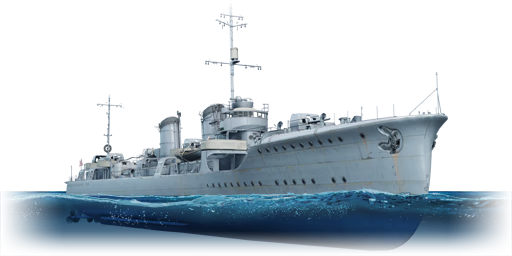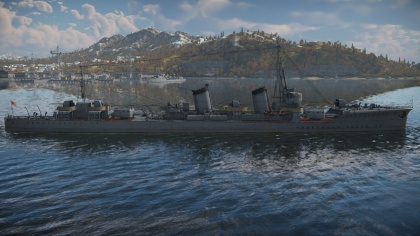IJN Mutsuki
Contents
Description
The Mutsuki-class, IJN Mutsuki, 1941 is a rank I Japanese destroyer
with a battle rating of 3.3 (AB/RB/SB). It was introduced in Update 1.89 "Imperial Navy".
General info
Survivability and armour
Talk about the vehicle's armour. Note the most well-defended and most vulnerable zones, e.g. the ammo magazine. Evaluate the composition of components and assemblies responsible for movement and manoeuvrability. Evaluate the survivability of the primary and secondary armament separately. Don't forget to mention the size of the crew, which plays an important role in fleet mechanics. Save tips for preserving survivability in the "Use in battle" section.
If necessary, use a graphics template to show the most well-protected or most vulnerable points in the armour.
Mobility
Write about the ship’s mobility. Evaluate its power and manoeuvrability, rudder rerouting speed, stopping speed at full tilt, with its maximum forward speed and reverse speed.
Armament
Primary armament
The Mutsuki is armed with four single 120mm mounts, one in the bow, one just aft of the bridge in between the funnels, and two towards the aft. All but the rearmost turrets aim forwards by default, making it relatively easy to hit targets ahead of her with her guns. Additionally, since they are all centrally mounted, it is possible to get all four turrets on target. However, they also take 12 seconds to reload, limiting the sustained fire ability of this vessel. The rearmost gun also has to turn more than 180 degrees to change the broadside it is firing from.
Secondary armament
The secondary armament of the Mutsuki is two type 92 7.7mm machine guns, each with 1940 rounds of ammunition. The mountings are both abreast of the bridge, giving good all around coverage, but no overlapping arcs of fire. They do virtually no damage and cannot be relied upon for defence against boats or aircraft.
Torpedo armament
The Mutsuki carries two triple centreline mountings for 610mm type 90 torpedoes, along with 6 reload torpedoes in lockers alongside the rearmost funnel. This gives it the ability to
Special armament
Depth charges, mines, rocket launchers and missiles are also effective in skilled hands and can take an off-guard opponent by surprise. Evaluate the ammunition of this type of armament and rate its performance in combat.
Usage in battles
Describe the technique of using this ship, the characteristics of her use in a team and tips on strategy. Abstain from writing an entire guide – don’t try to provide a single point of view, but give the reader food for thought. Talk about the most dangerous opponents for this vehicle and provide recommendations on fighting them. If necessary, note the specifics of playing with this vehicle in various modes (AB, RB, SB).
Pros and cons
Pros:
- Perfect fire angles of the main caliber guns
- Good max speed
Cons:
- Very vulnerable from air
History
As the Washington Naval Treaty entered effect, where it substantially limited the quantity of naval weaponry available to the signatory nations, Japan began developing more advanced naval designs to better parry the might of the U.S. Navy.
One such design was the Mutsuki-class destroyers, developed in the early 1920s. Although intended as an improvement over the preceding Kamikaze-class, the Mutsuki-class would become outdated the moment it entered service due to the fact that the even more advanced Fubuki-class was developed in parallel. Nonetheless, Mutsuki-class destroyers still had a prolific service life during WW2, even in the later stages when most were converted into transport vessels.
Mutsuki, the lead ship of her class, was laid down in May 1924 at the Sasebo Naval Arsenal shipyard and was completed in March 1926. The ship was initially commissioned under the name Destroyer No.19, only receiving the name ‘Mutsuki’ in August 1928.
Mutsuki’s combat record began with the outbreak of the Second Sino-Japanese War between China and Japan in the early 1930s. The first battle involving the destroyer during WWII was the invasion of Wake Island. Following the invasion, Mutsuki took part in many more major operations in the Pacific, such as the invasions in the Solomon Islands, New Guinea and Rabaul, while also participating in the Battle of the Coral Sea in 1942.
After undergoing repairs in July 1942, Mutsuki was reassigned to the 8th Fleet and participated in the bombardment of Henderson Field on 24 August 1942. However, Mutsuki met her fate the following day, after an American B-17 Flying Fortress bomber managed a direct hit on the ship’s mid section during the Battle of the Eastern Solomons. Mutsuki sunk on that fateful August day and was subsequently struck from Naval records in October 1942.
- From Devblog
Media
Excellent additions to the article would be video guides, screenshots from the game, and photos.
See also
Links to the articles on the War Thunder Wiki that you think will be useful for the reader, for example:
- reference to the series of the ship;
- links to approximate analogues of other nations and research trees.
External links
| Japan destroyers | |
|---|---|
| IJN | |
| Momi-class | IJN Momi |
| Mutsuki-class | IJN Mutsuki · IJN Satsuki |
| Fubuki-class | IJN Ayanami |
| Hatsuharu-class | IJN Hatsuharu · IJN Nenohi |
| Shiratsuyu-class | IJN Yuudachi |
| Yugumo-class | IJN Yugumo · IJN Hayanami · IJN Kiyoshimo |
| Shimakaze-class | IJN Shimakaze |
| Akizuki-class | IJN Akizuki · IJN Hatsuzuki |
| JMSDF | |
| Ariake-class* | JDS Yūgure (DD-184) |
| Harukaze-class | JDS Harukaze (DD-101) |
| Murasame-class | JDS Murasame (DD-107) |
| * Modified Fletcher-class destroyers | |





